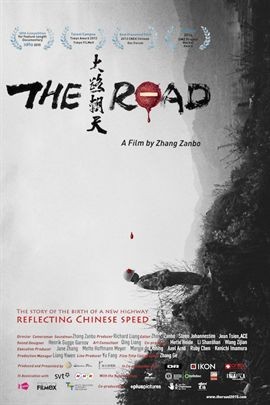The Road (2015)
 Independent film maker Zhang Zangbo spent three years embedded in a construction company in central China’s Hunan province. The result is a powerful and shocking insight into the human and environmental costs of China’s infrastructure boom.
Independent film maker Zhang Zangbo spent three years embedded in a construction company in central China’s Hunan province. The result is a powerful and shocking insight into the human and environmental costs of China’s infrastructure boom.
Zhang documents the corruption and abuse behind the construction of a stretch of the provincial highway by local officials and gangsters. It centres around protagonist Mr Meng – company vice president and “problem solver” – as he deals with injured workers demanding compensation; local people whose homes are destroyed, their family graves dug up, sacred trees and Buddhist temples flattened; local thugs demanding payment; and communist officials inspecting unsafe construction work.
This film is particularly poignant at a time when China’s companies are going overseas to build roads and infrastructure in countries with even weaker governance than the backwaters of Hunan.
Behemoth (2016)
This documentary combines with art film to produce a powerful testament to the human and environmental costs of coal mining and consumption in China, the world’s biggest user of coal and the biggest emitter of greenhouse gases. Director Zhao Liang – whose past work has exposed the fate of the most marginalised in Chinese society – shot the film on the grasslands of Inner Mongolia and in the “ghost town” of Ordos to show how rapid development has created hell on earth in China.
(Zhao Liang has given chinadialogue permission to use this video clip. It cannot be republished on any other platform)
The Mermaid (2016)
 This is a madcap aquatic comedy about a real estate tycoon who tries to redevelop an idyllic island and dolphin reserve, only to find himself the target of a wrathful group of merpeople.
This is a madcap aquatic comedy about a real estate tycoon who tries to redevelop an idyllic island and dolphin reserve, only to find himself the target of a wrathful group of merpeople.
Fans of Steven Chow will be familiar with the slapstick nonsensical humour, reminiscent of his earlier films Shaolin Soccer and Kung-fu Hustle. But deep down the underlying message is how humans are destroying the environment. The film ends with a merperson massacre reminiscent of hard hitting ecodoc The Cove.
The self-made business tycoon Liu Xuan is forced to come to terms with the fact his money is worthless in a world without "one single drop of clean water to drink or fresh air to breathe".
Up The Yangtze (2007)
 This documentary follows a 16-year-old girl who leaves school to work as a hostess on a luxury cruise boat on the Yangtze – organised for western tourists to wave goodbye to the disappearing landscape. During the film, the girl's family, who are subsistence farmers, must move to higher ground as their home is inundated by the flooding of the Three Gorges Dam – which displaced 1.3 million people. Canadian-Chinese director Yung Chang’s beautifully shot film captures the beauty of the river and the aspirations and struggles of young people in a rapidly changing modern China.
This documentary follows a 16-year-old girl who leaves school to work as a hostess on a luxury cruise boat on the Yangtze – organised for western tourists to wave goodbye to the disappearing landscape. During the film, the girl's family, who are subsistence farmers, must move to higher ground as their home is inundated by the flooding of the Three Gorges Dam – which displaced 1.3 million people. Canadian-Chinese director Yung Chang’s beautifully shot film captures the beauty of the river and the aspirations and struggles of young people in a rapidly changing modern China.
Jia Zhangke’s film Still Life (三峡好人) is another excellent but slower-moving account of the same topic: it depicts the fictional experiences of the people of Fengjie a small town on the Yangtze flooded by The Three Gorges. The director’s hallmarks are beautiful cinematography, long stares and little action.
Mountain Patrol: Kekexili (2004)
This film tracks the struggle of a small group of Tibetan park rangers against a band of poachers in the remote Tibetan region of Kekexili. The low budget project  was shot on the Tibetan plateau, and most of the roles are played by local amateur actors.
was shot on the Tibetan plateau, and most of the roles are played by local amateur actors.
It is based on a true story about the "Wild Yak Brigade", a volunteer group in the 1990s who tried to stop the Tibetan antelope being hunted to extinction for their fine wool.
Subsequently, the Chinese government declared Kekexili a "national nature preserve" and established a forestry bureau to protect it – and the number of antelopes has rebounded. However railways, dams and other large planned projects on the plateau now pose new threats to antelope habitat and migration routes.
West of the Tracks (2002)
 This nine hour epic charts the economic demise of one of the most densely populated industrial areas of north-east China. From 1999 director Wang Bing took a long journey across the railway that cuts through Shenyang province, the region that was once the heart of the planned central economy with its labour-intense steel works and blast furnaces. The province was also the focus of economic reform and bankruptcies that led to the demolition of many industrial plants, heaping hordes of desolate workers onto the unemployment scrapheap.
This nine hour epic charts the economic demise of one of the most densely populated industrial areas of north-east China. From 1999 director Wang Bing took a long journey across the railway that cuts through Shenyang province, the region that was once the heart of the planned central economy with its labour-intense steel works and blast furnaces. The province was also the focus of economic reform and bankruptcies that led to the demolition of many industrial plants, heaping hordes of desolate workers onto the unemployment scrapheap.
The observational documentary offers a fascinating insight into the backrooms and workers’ quarters of half-abandoned factories. Over a decade later, it resonates strongly as the region faces a fresh wave of lay-offs as coal and steel plants shut down to make way for a "greener" China.







